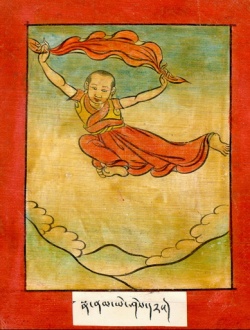Difference between revisions of "Nanam Yeshe De"
| Line 1: | Line 1: | ||
[[File:Nanam_Yeshe_De.jpg|thumb|250px|]] | [[File:Nanam_Yeshe_De.jpg|thumb|250px|]] | ||
| − | |||
| − | As a young [[monk]] his {{Wiki|scholarship}} earned him the title of '[[bande]]' ([[teacher]]). He translated hundreds of texts, [[taught]] the [[Abhidharma]], which he transmitted to [[Lhalung Pelgyi Dorje]] (lha lung dal gyi | + | |
| + | |||
| + | [[Yeshe De]] ([[sna nam ye shes sde]]) was born into the {{Wiki|clan}} of [[Nanam]] and became one of the three foremost [[translators]] of the imperian {{Wiki|era}}. Is is counted among the [[twenty-five disciples of Padmasambhava]]. | ||
| + | |||
| + | As a young [[monk]] his {{Wiki|scholarship}} earned him the title of '[[bande]]' ([[teacher]]). He translated hundreds of texts, [[taught]] the [[Abhidharma]], which he transmitted to [[Lhalung Pelgyi Dorje]] ([[lha lung dal gyi rdo rje]]), and [[Prajñāpāramitā]], and studied the [[Nyingma tantras]] comprehensively. He was one of the main [[translators]] of the [[Kangyur]] ([[bka' 'gyur]]), as well as in the collection of the translations of the [[Nyingma tantras]]. He also composed works on the differences in [[philosophical]] [[views]]. | ||
A [[master]] of the [[Vajrakīlaya]] [[tantra]], he [[realized]] the [[illusory]] [[nature]] of [[phenomena]] and cut the [[Wikipedia:Rope|cord]] of mind-made [[karmic conditioning]], which left him free to soar in the sky like a bird. | A [[master]] of the [[Vajrakīlaya]] [[tantra]], he [[realized]] the [[illusory]] [[nature]] of [[phenomena]] and cut the [[Wikipedia:Rope|cord]] of mind-made [[karmic conditioning]], which left him free to soar in the sky like a bird. | ||
Latest revision as of 18:51, 15 December 2015
Yeshe De (sna nam ye shes sde) was born into the clan of Nanam and became one of the three foremost translators of the imperian era. Is is counted among the twenty-five disciples of Padmasambhava.
As a young monk his scholarship earned him the title of 'bande' (teacher). He translated hundreds of texts, taught the Abhidharma, which he transmitted to Lhalung Pelgyi Dorje (lha lung dal gyi rdo rje), and Prajñāpāramitā, and studied the Nyingma tantras comprehensively. He was one of the main translators of the Kangyur (bka' 'gyur), as well as in the collection of the translations of the Nyingma tantras. He also composed works on the differences in philosophical views.
A master of the Vajrakīlaya tantra, he realized the illusory nature of phenomena and cut the cord of mind-made karmic conditioning, which left him free to soar in the sky like a bird.
Sources
Tarthang Tulku. 1975. Bringing the Teachings Alive. Cazadero, CA: Dharma Publishing,
Smith, Gene. 2006. “Siddha Groups and the Mahasiddhas in the Art and Literature of Tibet”. In Holy Madness: Portraits of Tantric Siddhas. New York: Rubin Museum of Art, p. 72.
Roerich, George, trans. 1996. The Blue Annals. 2nd ed. Delhi: Motilal Banarsidas, p. 345.
Gu ru bkra shis. 1990. Gu bkra'i chos 'byung. Beijing: Krung go'i bod kyi shes rig dpe skrun khang, p. 172.
Arthur Mandelbaum August 2007Mandarava
